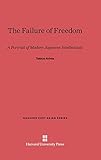The Failure of Freedom : A Portrait of Modern Japanese Intellectuals / Tatsuo Arima.
Material type: TextSeries: Harvard East Asian Series ; 39Publisher: Cambridge, MA : Harvard University Press, [2013]Copyright date: ©1969Edition: Reprint 2013Description: 1 online resource (296 p.)Content type:
TextSeries: Harvard East Asian Series ; 39Publisher: Cambridge, MA : Harvard University Press, [2013]Copyright date: ©1969Edition: Reprint 2013Description: 1 online resource (296 p.)Content type: - 9780674280106
- 9780674280113
- 915.2/03/320922
- DS822.4 ǂb A756 1969eb
- online - DeGruyter
| Item type | Current library | Call number | URL | Status | Notes | Barcode | |
|---|---|---|---|---|---|---|---|
 eBook
eBook
|
Biblioteca "Angelicum" Pont. Univ. S.Tommaso d'Aquino Nuvola online | online - DeGruyter (Browse shelf(Opens below)) | Online access | Not for loan (Accesso limitato) | Accesso per gli utenti autorizzati / Access for authorized users | (dgr)9780674280113 |
Browsing Biblioteca "Angelicum" Pont. Univ. S.Tommaso d'Aquino shelves, Shelving location: Nuvola online Close shelf browser (Hides shelf browser)

|

|

|

|

|

|

|
||
| online - DeGruyter Sleuthing in the Stacks / | online - DeGruyter Charles Macklin : An Actor’s Life / | online - DeGruyter Individualism and Nationalism in American Ideology / | online - DeGruyter The Failure of Freedom : A Portrait of Modern Japanese Intellectuals / | online - DeGruyter Status and Kinship in the Higher Civil Service : Standards of Selection in the Administrations of John Adams, Thomas Jefferson, and Andrew Jackson / | online - DeGruyter Ten Nights in a Bar-Room, And What I Saw There / | online - DeGruyter Eugène Scribe and the French Theatre, 1815-1860 / |
Frontmatter -- Preface -- Contents -- I. THE REVOLUTIONARY RESTORATION -- II. UCHIMURA KANZŌ: THE POLITICS OF SPIRITUAL DESPAIR -- III. THE ANARCHISTS: THE NEGATION OF POLITICS -- IV. JAPANESE NATURALISM: THE LIMITATIONS OF EXPERIENCE -- V. THE SHIRAKABA-HA: THE TYRANNY OF ART -- VI. ARISHIMA TAKEO: BOURGEOIS CRITICISM -- VII. AKUTAGAWA RYŪNOSUKE: THE LITERATURE OF DEFEATISM -- VIII. PROLETARIAN LITERATURE: THE TYRANNY OF POLITICS -- CONCLUSION -- NOTES -- BIBLIOGRAPHY -- GLOSSARY -- INDEX
restricted access online access with authorization star
http://purl.org/coar/access_right/c_16ec
An excellent introduction to Japanese intellectual history in the first third of the twentieth century, this is a study of the intellectual atmosphere that made the development of a constitutional form of government difficult. As heirs to the Meiji Restoration, modern Japanese intellectuals were trapped by the historical paradox that modern Japan was born not so much of the victory of the new forces over the old, as of the skillful self-transformation of the old forces themselves. To reject parts of new Japanese society often meant to reject the whole of it.Tatsuo Arima examines the period's philosophical and religious writings and the main literary figures and groups and their works and theories about literature. He finds a widespread anticonstitutional mentality and relates it to the intellectuals' political behavior. In particular, he analyzes the reasons why prewar Japanese intellectuals, who seemed to be so opposed to the rise of nationalism, took no socially effective action to prevent its emergence and subsequently became its victims.
Mode of access: Internet via World Wide Web.
In English.
Description based on online resource; title from PDF title page (publisher's Web site, viewed 29. Nov 2021)


